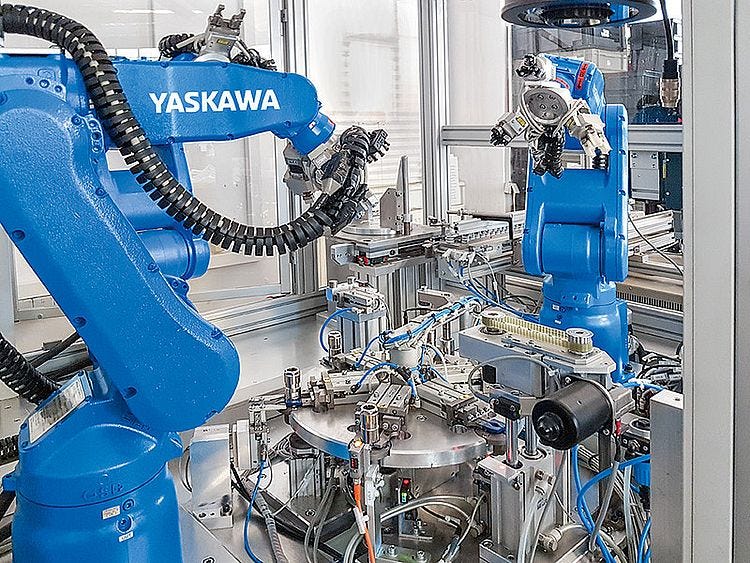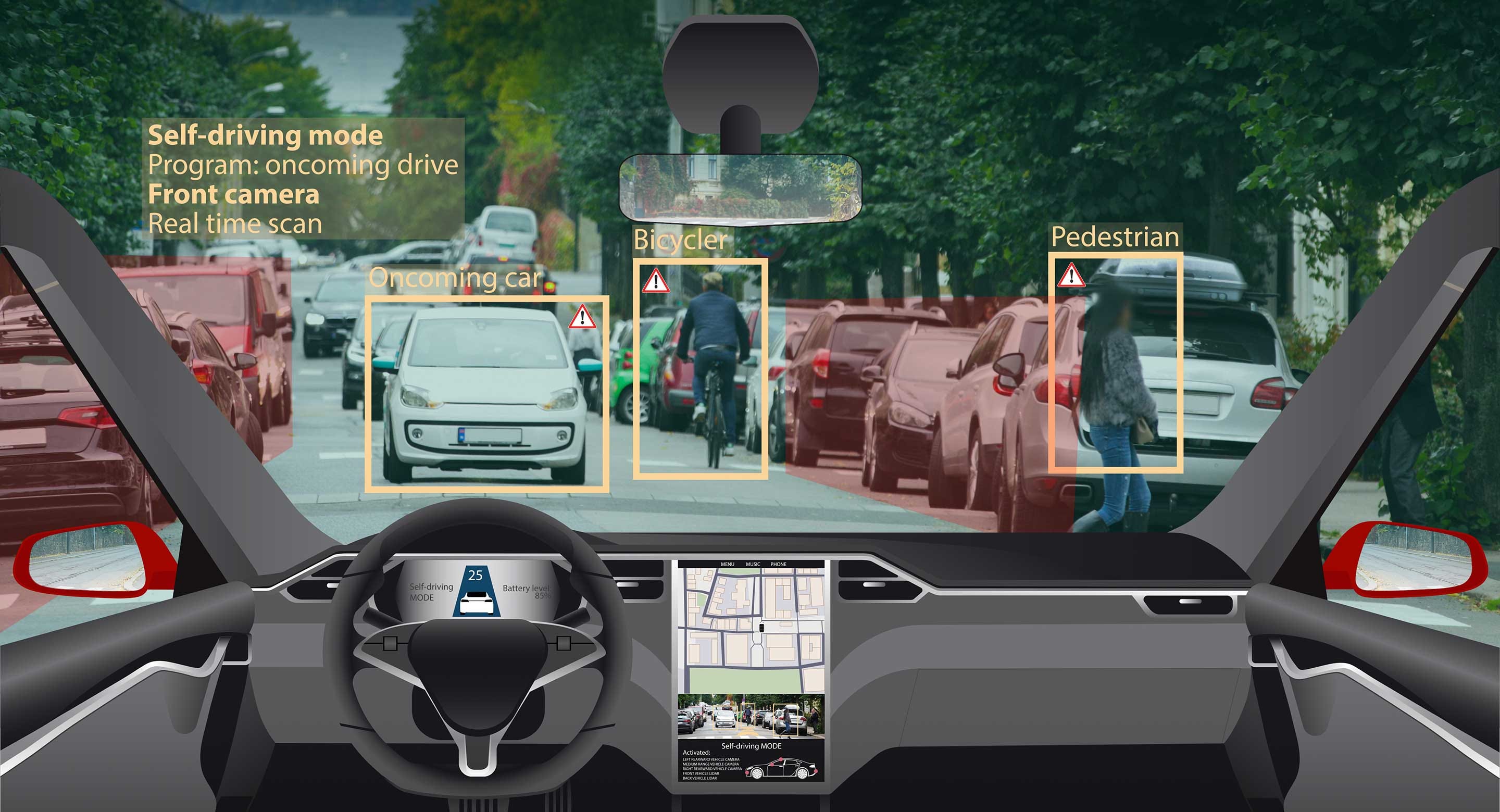int是终结符还是非终结符
Machine learning has been driving a new wave of automation in the past decade. The speed of this wave is up for debate, but its direction and strength are beyond doubt — for it is driven by good old economic interest. It always helps to remember:
在过去的十年中,机器学习一直在推动自动化的新潮流。 这一浪潮的速度尚待辩论,但其方向和力量是毋庸置疑的-因为它是由良好的旧经济利益驱动的。 它总是有助于记住:
Corporations swarm towards profit surely as maggots to a corpse.
公司肯定会as积尸体,以牟取暴利 。
And unimaginable profit lies just beyond the mechanical horizon. The lauded principles of the Free Market move companies to pay workers the absolute minimum, so the idea of a worker that needs no wages is a utopian dream for every CEO with their souls oriented towards the bottom line.
难以想象的利润超出了机械的视野。 自由市场的备受赞誉的原则使公司向工人支付最低工资,因此,对于每个以灵魂为底线的首席执行官而言,不需要工资的想法是他们的乌托邦梦想。
Many economists are skeptical of the coming robotic revolution. They point out how humans have always been automating our work (the water wheel, for example), and we simply make new jobs to fill out the slack. This is good, I will concede, so long as the displaced workers can find meaningful work afterwards. I don’t imagine this to be the case in the future.
许多经济学家对即将到来的机器人革命持怀疑态度。 他们指出了人类如何一直使我们的工作自动化(例如水车),而我们只是简单地从事新工作来填补这一空缺。 我要承认,这很好,只要流离失所的工人以后能找到有意义的工作。 我不认为将来会发生这种情况。
我们生活在开始 (We Live in the Beginning)
With the rapid development of computer vision through convolutional neural nets, we’re rapidly approaching the age self-driving cars. To put that in perspective, there’s ~3.5 million truckers in the US, nearly a million ride-service drivers and perhaps half a million bus drivers. That’s about 3% of the 165 million workforce who may have to look elsewhere when companies decide it’s much cheaper to buy and maintain a driverless vehicle.
随着卷积神经网络对计算机视觉的迅猛发展,我们正Swift接近自动驾驶汽车的时代。 从这个角度来看,美国大约有350万卡车司机 ,近100万乘车司机和50万公共汽车司机。 在公司决定购买和维护无人驾驶汽车便宜得多时,1.65亿劳动力中大约有3%可能需要将目光转向其他地方。
How many jobs are actually at risk in general? Figures vary: 20 million US factory jobs by 2030, 25% of US jobs, 15–30% of workers displaced by 2030. There’s myriad factors influencing the speed of the wave.
总体上实际上有多少工作处于危险之中? 数字各不相同: 到2030年 , 美国将有2000万个工厂工作岗位 , 占美国工作岗位的25%, 到2030年将有 15-30%的工人流离失所 。 影响波速的因素很多。
Notably, the sources I linked were written pre-Covid. Visions of the “six-feet office” have pushed many firms to downsize and turn roles remote. Many companies are investing heavily in automation infrastructure instead of rehiring.
值得注意的是,我链接的来源是在Covid之前编写的。 “六英尺办公室”的愿景迫使许多公司缩减规模并将角色转变为远程角色。 许多公司正在对自动化基础设施进行大量投资,而不是重新雇用。
This, too, makes economic sense: The grand economic machine has been grievously disrupted, and nobody knows when things will return to “normal”. The drawbacks of automating your workforce — losing out on face to face human interaction among them — have been rendered null by the pandemic. Machines can’t get sick.
这在经济上也是有道理的:宏伟的经济机器已被严重破坏,而且没人知道什么时候情况会恢复到“正常”状态。 劳动力大流行使自动化劳动力的缺点(使他们在面对面的人际互动中失去优势)变得无效。 机器不会生病。
分布不均 (Uneven Distributions)
The wave of automation moves unevenly. Simpler, repetitive tasks lend themselves to automation much more than abstract, cognitive work. Maybe you’ve seen the kiosks that take your order at fast food joints; we’ve begun to implement burger-flipping bots as well.
自动化浪潮发展不平衡。 简单,重复的任务比抽象的认知工作更能实现自动化。 也许您已经看到了在快餐店点餐的服务亭 ; 我们也已开始实施翻转汉堡的机器人 。
This means that certain industries will be displaced before others:
这意味着某些行业将先于其他行业被取代:

The more predictable the task, the more likely it will be automated in the near future. To consider how much your job is at risk, ask yourself: “How often am I faced with an unknown variable or situation? How often am I surprised?”.
任务的可预测性越高,在不久的将来将更有可能实现自动化。 要考虑您的工作面临多少风险,请问自己:“我多久遇到一个未知的变量或情况? 我多久感到惊讶?”。
These elements of surprise make it more difficult to find a viable machine learning solution to a given challenge.
这些令人惊讶的要素使针对给定挑战找到可行的机器学习解决方案变得更加困难。
This visualization from McKinsey offers a good overview of “how susceptible is this industry/role to being replaced”. It’s interesting to note the differences between industries — data collection is more variable in healthcare than agriculture — but keep in mind that this is calculated with “currently demonstrated technology” in mind. Every step forward in AI changes these likelihoods in strange ways.
麦肯锡公司提供的这种可视化效果很好地概述了“该行业/角色被替换的可能性”。 有趣的是注意到行业之间的差异-医疗行业的数据收集比农业数据的可变性更大-但请记住,这是在考虑“当前已证明的技术”的情况下进行的。 人工智能的每一步都以奇怪的方式改变了这些可能性。
The automation of these jobs poses a difficult challenge: How do we keep these displaced workers productive? We’ll be losing chunks of various industries piece by piece, in smaller or larger groups. Where can they go?
这些工作的自动化提出了一个艰巨的挑战:我们如何使这些流离失所的工人保持生产力? 我们将逐渐失去各个行业的大块或小块。 他们可以去哪里?
This is why people often refer to coding as “the new literacy”. There exists this idea that there’s enough room for tech (and to a lesser extent, all of STEM) to grow to encompass the increasingly-displaced workforce. Whether this is the correct or best solution is another matter entirely, but I would wager it’s more realistic than the government redistributing significant resources in this interim period.
这就是为什么人们经常将编码称为“新素养”。 存在这样一种想法,即技术(在较小程度上,STEM的全部)有足够的增长空间来容纳不断流离失所的劳动力。 这到底是正确的还是最佳的解决方案,完全是另一回事,但是我敢打赌,这比政府在这段过渡时期重新分配大量资源更为现实。
超越稀缺 (Beyond Scarcity)
We’ve identified the wave of automation and established its growing momentum and uneven effects. Now I want you to consider the “endgame” of all of this.
我们已经确定了自动化浪潮,并确定了它的增长势头和不均衡的影响。 现在,我希望您考虑所有这一切的“终结”。
What’s the purpose of machine learning? To make our lives easier, one would hope, but more practically it’s to increase productivity. The economically-driven goal of AI is to increase work efficiency — to reduce the amount we have to work, or enable us to achieve more with the same effort.
机器学习的目的是什么? 为了使我们的生活更轻松,人们希望,但是实际上,这是为了提高生产力。 AI的经济驱动目标是提高工作效率-减少工作量,或使我们能够以相同的努力实现更多目标。
As more and more jobs are automated, is there enough room in the tech economy to accommodate our displaced workers? Perhaps.
随着越来越多的工作自动化,技术经济中是否有足够的空间来容纳我们的流离失所工人? 也许。
But more then that: if technology continues to develop at this pace (or any Moore’s trajectory), is that new work even necessary?
但是还不止如此:如果技术继续以这种速度(或任何摩尔的轨迹)发展,那么是否有必要进行新工作?
Now we’re delving into the realm of post-scarcity philosophy. Far in the future, certainly, but the necessary conditions will inevitably be met as the world continues to progress.
现在,我们正在研究后稀缺哲学领域。 当然,在不久的将来,但是随着世界的不断发展,必然会满足必要的条件。
Consider the hypothetical: If we suddenly automate half the jobs in the world tomorrow, we’re suddenly generating the same GDP/productivity with none of the labor (and paying a fraction of the price in machine maintenance). What do we do with the new “slack” made possible through automation?
考虑以下假设:如果我们明天突然使世界上一半的工作自动化,那么我们将在没有人工的情况下突然产生相同的GDP /生产率(并支付一部分机器维护费用)。 我们如何处理通过自动化实现的新“松弛”呢?

There’s two paths to take:
可以采取两种方法:
- Companies reap huge profits from no-wage automated labor. Displaced workers must ‘up-skill’ and find new jobs 公司从无薪自动化劳动中获利丰厚。 流离失所的工人必须“熟练”并找到新工作
- The “slack” wealth is redistributed through UBI or other programs. People spend their lives beyond ‘productivity’ 通过UBI或其他程序重新分配“闲散”财富。 人们度过了“生产力”以外的生活
The former is much more likely to happen, at least for a while. Many will feel left behind, but the God of Capitalism is more than happy to leave them behind — it’s their fault for not changing with the times, of course.
前者更有可能发生,至少有一段时间。 许多人会感到被抛在后面,但是资本主义之神很乐意将他们抛在后面-当然,这是他们不与时俱进的错。
The second is a more benevolent dream, but I believe it may be a predictable destination. Universal Basic Income is a controversial idea, but the pandemic is speeding it up. The problem has always been the argument of inflation or relative pricing and spending; I would argue that “slack” productivity from automation will solve this issue.
第二个是更仁慈的梦想,但我相信这可能是可以预见的目的地。 普遍基本收入是一个有争议的想法,但大流行正在加速它的发展 。 问题一直是通货膨胀或相对定价和支出的争论。 我认为自动化带来的“松弛”生产力将解决这个问题。
Which path you believe in is largely based on your answer to the question:
您相信哪条路径主要取决于您对问题的回答:
Is machine made to serve man?
机器是为人服务的吗?
Or is man made to serve machine?
还是人为服务机器?
说这的好方法是“摩擦” (The Nice Way to Say this is “Friction”)
The government moves as its corporate donors decide, so we’ll surely experience the first path in the coming future. They’ll call it something pleasant like ‘productive shifts’ or ‘gainful friction’. Robot took your job? Buck up, kiddo. Go give those bootstraps a pull.
政府根据企业捐赠者的决定采取行动,因此,我们一定会在未来的将来经历第一条道路。 他们会称其为“生产性转变”或“大摩擦”之类的令人愉快的东西。 机器人接了你的工作吗? 加油,孩子。 去给那些靴子拉一下。
And then reality begins to catch up: If wealth begins to concentrate even further among the corporate elite, then there’s less money in the pockets of consumers. Consumers begin to spend less. Suddenly nobody’s consuming all these new automaton-created products. Profits plummet and wealthy people start paying attention.
然后现实开始迎头赶上:如果财富开始在企业精英中进一步集中,那么消费者口袋里的钱就会更少。 消费者开始减少支出。 突然,没有人会消费所有这些由自动机创建的新产品。 利润暴跌,富人开始关注。
I haven’t even mentioned the enormous societal unrest that unemployment and displacement will cause. Look at the past few months in America: Long-brewing issues of social and racial justice have boiled over into active protests. But why now? These problems have existed for ages.
我什至没有提到失业和流离失所将造成的巨大社会动荡。 看看美国过去的几个月:长期存在的社会和种族正义问题已经演变成积极的抗议活动。 但是为什么现在呢? 这些问题已经存在了很长时间。
The lockdown changed individual incentives. Plenty of people suddenly lost jobs, or can’t go in to work in person, or lost hope of employment for the foreseeable future. Suddenly people aren’t obligated by economic interest (ex. “the freedom to starve”) to work obediently as part of the Machine, and they find themselves with the freedom to express their displeasure towards said Machine.
封锁改变了个人动机。 在可预见的将来,很多人突然失去工作,或者不能亲自去工作,或者失去了就业的希望。 突然之间,人们没有经济利益的义务(例如,挨饿的自由)作为机器的一部分服从地工作,他们发现自己有表达对机器的不满的自由。
When you run the world by distracting people with bread and circuses, you’d damn well better keep giving them bread.
当您通过用面包和马戏团分散人们的注意力来经营世界时, 最好还是继续给他们面包。
幸福的本质 (The Nature of Wellbeing)
Is is just to dictate that all men must work merely to exist? We may move beyond the question of “just” in a few decades.
仅仅是为了指示所有人必须为了生存而努力吗? 在几十年内,我们可能会超越“公正”的问题。
Proponents of “From each according to his ability, to each according to his needs” never quite measured up, because they relied on humans to push a system (inherently less productive than capitalism) beyond scarcity.
“从每个人的能力到每个人的需求”的拥护者从来没有完全衡量过,因为他们依靠人类来推动一个系统(本来生产力比资本主义低)超越稀缺性。
But if automation gives us that slack — if robots have the capability to “free” us from labor — what should we do?
但是,如果自动化给我们带来了懈怠-如果机器人有能力“解放”我们的劳动力,那么我们应该怎么做?
Much has been written on man deriving his meaning through labor. There is certainly truth in finding fulfillment through creation and hard-won accomplishment, but I believe this belief has been skewed by the fact that man has always had to labor merely to exist.
关于人通过劳动得出他的意思的文章很多。 通过创造和来之不易的成就来寻求成就肯定是有道理的,但是我相信,人们一直只为生存而工作,这一事实使这种信念变得歪曲。
The few elites who could afford leisure, who had the freedom to pursue “higher” crafts, certainly enjoyed their adventures. There is another argument to be made of debauchery born from excess — look towards the fall of the Roman empire — that idle hands are surely the devil’s playthings.
少数有能力负担休闲的精英人士,他们自由地追求“高级”手Craft.io品,当然享受着冒险。 还有一个论点是放荡产生于过度的放荡生活-展望罗马帝国的衰落-闲置的手肯定是魔鬼的玩物。
But for all of history, most humans haven’t been able to decide this for themselves. The vast majority of people labor as needed to stay alive, and do their best to find meaning in their given work & some leisure during fleeting free hours. One wonders if the idea of “you can only find meaning through work” has survived because it helps citizens tolerate situations that otherwise seem meaningless, because many despair of wasting their lives on activities they despise.
但是,从整个历史来看,大多数人还无法自行决定。 绝大多数人需要为维持生存而工作,并尽力在给定的工作中找到意义,并在短暂的闲暇时间中获得一些休闲。 一个人想知道“您只能通过工作找到意义”的想法是否得以保留,因为它可以帮助公民容忍那些原本就毫无意义的情况,因为许多人在他们鄙视的活动上浪费了生命。
残局 (The Endgame)
I envision a future where man is freed from the necessity of labor, where technological advancements deliver us from the cult of capital and launch humanity into an unexplored void of being:
我设想的未来将使人们摆脱劳动的需要,技术的进步将我们从资本的邪教中解救出来,并将人类带入一个无法探索的空白:
When we don’t have to do anything, what do we do?Whatever we find interesting.
当我们不需要做任何事情时,我们会做什么?
I could criticize my own argument as the fantasies of a lazy dreamer, but it is difficult to imagine automation will slow down. A predictable obstacle is that the economy does its best to keep people “productive” when that productivity is no longer truly needed (imagine tech & all white-collar industries becoming as saturated as the podcasts).
我可以批评自己的观点是一个懒惰的梦想家的幻想,但是很难想象自动化会放慢速度。 可以预见的障碍是,当不再真正需要生产力时,经济将尽最大努力使人们保持“生产力”(想象技术和所有白领行业变得像播客一样饱和)。
We may have a hard time detaching from the notion that people must work to exist. It is ingrained in our cultural psyche, because we’ve always needed to work to exist. What sort of creature are we when completely free? I’m terribly interested in finding out.
我们可能很难摆脱人们必须为生存而努力的观念。 它在我们的文化心理中根深蒂固,因为我们一直需要为生存而努力。 当我们完全自由时,我们是什么样的生物? 我非常想找出答案。
Will we be happy? Perhaps, perhaps not. That warrants another investigation of economic psychology and the productization of expectation. But people are generally happier doing things they’re interested in, so one would hope freedom brings joy.
我们会快乐吗? 也许,也许不是。 这就需要对经济心理学和期望的产物进行另一次调查。 但是人们通常会更乐于做自己感兴趣的事情,因此人们希望自由能带来快乐。
Either way, automation will remove the largest obstacle (excuse?) holding us back from finding well-being, and it will be up to every individual to find their meaning in the void. How exciting.
无论哪种方式,自动化都会消除阻碍我们找到幸福的最大障碍(借口?),并且每个人都必须在虚无中找到自己的意义。 多么激动人心。
翻译自: https://medium.com/@mark.s.cleverley/whats-the-endgame-of-automation-a7a24431e8fc
int是终结符还是非终结符























 2719
2719

 被折叠的 条评论
为什么被折叠?
被折叠的 条评论
为什么被折叠?








